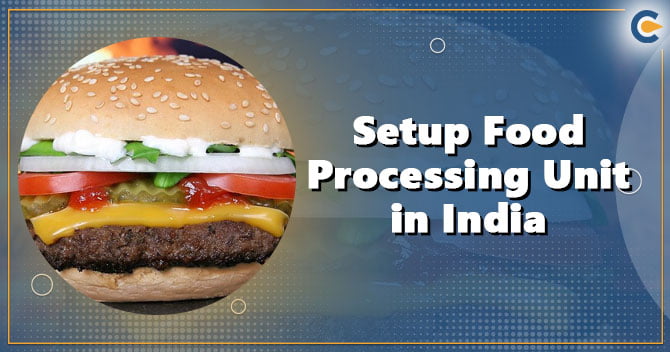India is a nation that reaps most of its revenue via its agrarian economy. Our country is the 6th largest nation in the food & grocery market and the 5th large in terms of the retail marketplace globally. Food processing is a promising sector that adheres to limitless growth opportunities. In this write-up, we will walk you through an effective setup procedure for a food processing unit and recites some important aspects for the same.
What you do mean by a food processing unit?
Food processing unit converts raw material into a consumable product via different techniques and methods. Such units are an important part of practices such as horticulture, agriculture, animal husbandry, plantation, and fisheries. It also entails other companies that leverage agricultural inputs for preparing eligible items. This food manufacturing industry is one the most stable businesses which could generate proliferating profit overtimes if managed well.
Read our article:How to Register Food Business Online with FSSAI?
An Overview on India’s Food Processing Sector
The food processing unit has a pivotal role to play in connecting Indian agriculturists to customers in the local and global markets. The Ministry of Food Processing Industries (MoFPI) is striving hard to increase the volume of investment across the value chain. The industry employs more than 1.93 million people, spanning over 39,748 registered units with fixed capital of $32.75 bn. The primary industries constituting this industry are sugar, grains, beverages, edible oils, & dairy products.
Last year Indian Government[1] sanctioned more than 130 food processing projects across different states. The key sub-segments of such industries include Fisheries, Dairy, Poultry & Meat processing, Fruits & Vegetables, Food retail, etc.
What is the Importance of Food Processing Business?
Food processing is a critical process that ensures consistent availability of food for the general public regardless of its perishable variety and its seasonal nature. Following pictorial representation reflects the pros of having a food processing sector in India


A Viable Approach to Setup Food Processing Unit in India
The government of India had underpinned various schemes as well as policies to help establish food processing units. GOI also facilitates ample funding to this sector for modernizing the industries.
To commence a food business in India, an FSSAI license is mandatory. FSSAI is the body that administers food safety laws and issues Food licenses to eligible entities. At present,
FSSAI license is available under a 3-tier system i.e. Basic, State, and Central depending on the annual turnover of the applicants. Nonetheless, there are certain guidelines that one has to follow to legally protect the company. These guidelines are as follow
Business Research & Market Analysis
Comprehending the market and opting for the product to be manufactured are the priorities for any new business. While selecting the product, the investor must take its market viability into account. It is also imperative to have the best prediction regarding the economic and industrial outcomes of the prevailing industries, which lets you identify the market size, rivals, and trends.
Once this is done, the business must be structured accordingly as per the needs to make it legally viable. There are options such as partnership firm, LLP, Private limited company, Public Ltd company, etc with their benefits and downsides. These structures can be selected based onthe scope of operation, annual revenue & other compulsory criteria. It is advisable to hire an expert who can suggest the best fit structure.
Location of the Food Processing Unit
Identification of market size is critical to determine an apt location for the factory. It’s a good idea to check a location that has viable & seamless accessible resources such as labor, electricity, raw materials, transportation, etc. Another imperative parameter that seeks due consideration is the government-based tax policies and subsidies. An optimal location can be identified by considering aforesaid parameters along with the accessibility to raw material in a certain location. The perishable nature of edible items and timeline also seeks due consideration for ensuring consistent availability of good produce throughout the year.
Business Strategies& Plan
All the research & analysis made at the initial phase should then be synced according to the needs of the processing units. New strategies & policies must be computed to generate a blueprint of how the firm ought to perform activities and the upcoming plans must be outlined properly.
Funding
Every business seeks ample capital for the raw material’s procurement and seamlessmanagement of value chains as the industry grows. The funds also tend to vary as per the scope of operation and nature of the industry. Thus, it is imperative to have shareholders and to identify a viable source of funding for the company.
Statutory Obligations
Once the unit is established, it must be registered with respective authorities before commencing the operation. As per the Companies Act 2013, the companies should seek mandatory registration by furnishing required documents and fees. Apart from that, registering under various taxes such as PAN, service tax, sales tax is also important for the company. The protection of IP assets may sound irrelevant at an early stage of business, yet it must be done to avoid future disputes and costly litigation. Moreover, adherence to the Act like Standard and Weight Measure Act & Food Safety and Standards Act, 2006 is highly important.
Implementation
Implementation is inherently the trickiest part of any business formation. This is the phase where the likelihood of making mistakes is significantly higher. The business owners, in such cases, must seek Subject Matter Experts (SMEs) to ensure seamless deployment of pre-established plans. The proper segmentation of the department and recruitment of the right candidates are also a part of the implementation stage, which indeed requires a certain level of expertise.
Conclusion
This write-up has clearly indicated that the formation of a new food processing unit in India seeks an extensive and clear approach. Therefore, business owners are required to have a proper understanding of legal implications to ensure the seamless foundation of a production unit. One has to encounter tons of paperwork and legal implication before setting up a new business. With CorpBiz’s services at your disposal, you can expect seamless commencement of your business journey. The CorpBiz’s expert can give you much-needed patronage that is required to comply with existing bylaws.
Read our article:FSSAI Registration for Event Management: Things you must know











